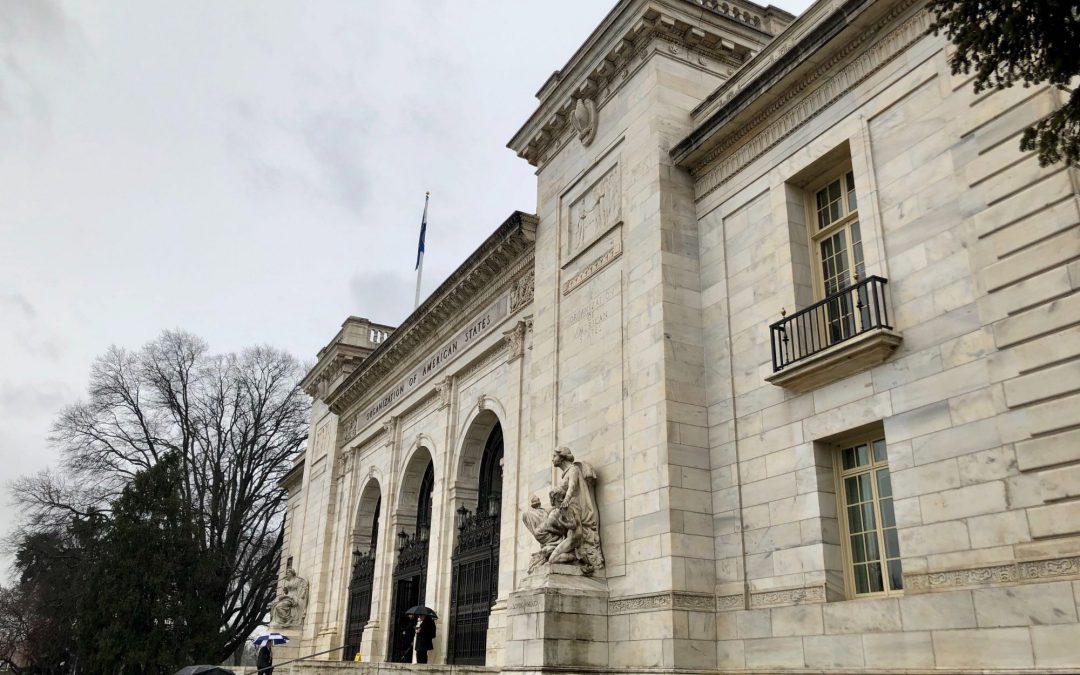WASHINGTON — Secretary of State Mike Pompeo made an unannounced appearance at an Organization of American States Permanent Council special meeting Thursday to urge the group to unequivocally recognize Juan Guaido as the legitimate president of Venezuela.
Venezuelan President Nicolas Maduro has not relinquished power, but 35-year-old opposition leader and National Assembly President Guaidó declared himself the country’s president this week, saying Maduro’s reign is illegitimate.
His claim to the presidency on an interim basis has been affirmed by the U.S., as well as many other OAS states. However, several countries stood by the legitimacy of Maduro’s presidency at Thursday’s meeting, and others have remained neutral, emphasizing the need for talks to resolve the conflict.
In a contentious two-hour meeting, representatives from 27 of the 35 OAS member countries delivered statements, the majority of them favoring Guaido’s claim to the presidency. Delegates from Venezuela, Nicaragua and El Salvador, however, were fiery in their defense of Maduro’s legitimacy.
Despite dissent among OAS member countries, Pompeo took an uncompromising stance. “The time for debate is done,” he said. “The regime of former president Nicolas Maduro is illegitimate.”
Pompeo, however, stressed humanitarian concerns in declaring U.S. support for Guaido. He announced that, at the request of Guaido, the U.S. was prepared to deliver more than $20 million in humanitarian aid to Venezuela to address food and medicine shortages.
Beyond a condemnation of the Maduro regime for corruption, the importance of protecting human rights in Venezuela was frequently emphasized.
“The eyes of the democratic world are on Venezuela,” said delegate Hernán Salinas of Chile in Spanish, “and history will know the role played by the OAS defending democracy and human rights in this situation.”
In spite of the concerns voiced by many OAS delegates about Maduro’s legitimacy, Asbina Ixchel Marin Sevilla, the Venezuela representative, insisted that OAS recognition of Guiado was tantamount to a coup d’état by the U.S.
Speaking in Spanish, she labeled U.S. involvement as a “huge international criminal act” perpetrated by a “racist, supremacist, imperialist power.”
Pompeo reiterated that the U.S. considers all declarations by Maduro and his government invalid. Wednesday, he defied Maduro’s decision to severe severing diplomatic ties between the U.S. and Venezuela and order U.S. foreign service officers out of the country.
Francisco Daniel Gutierez, the Belize representative, took a different line than Pompeo and other OAS representatives. He forcefully condemned conditions in Venezuela, but stopped short of endorsing Guaido’s claim to the presidency and emphasized the need for prudence and dialogue.
“When member states within an organization use that organization as a vessel to serve narrow outcomes, however well-intentioned,” Gutierez said, “they sow the seeds for that organization’s eventual demise.”
All told, 15 states whose delegates were present at the meeting affirmed the OAS declaration in support of the new Venezuelan president, including the U.S. and Canada. Seven countries sided with Maduro, and five more, including Mexico and Belize, did not endorse Guaido.
In addition to the OAS countries that have backed Maduro, Russia, China, Iran, Syria and Turkey have all issued statements of support.

